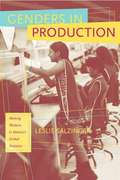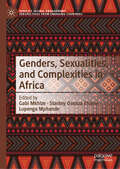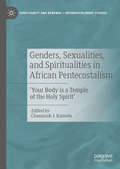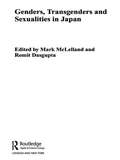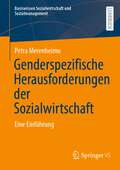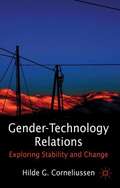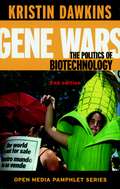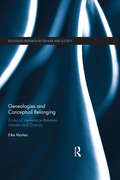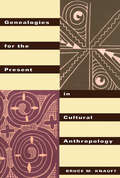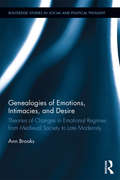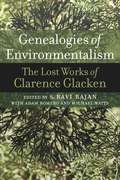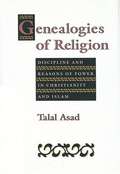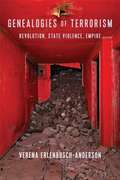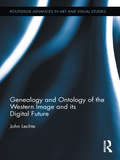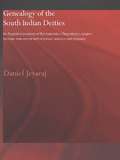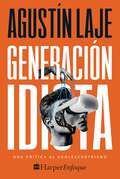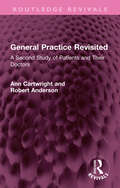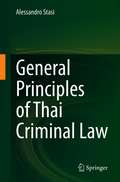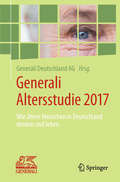- Table View
- List View
Genders in Production: Making Workers in Mexico's Global Factories
by Leslie SalzingerIn this engrossing and original book, Leslie Salzinger takes us with her into the gendered world of Mexico's global factories. Her careful ethnographic work, personal voice, and sophisticated analysis capture the feel of life inside the maquiladoras and make a compelling case that transnational production is a gendered process. The research grounds contemporary feminist theory in an examination of daily practices and provides an important new perspective on globalization.
Genders, Sexualities, and Complexities in Africa (Africa's Global Engagement: Perspectives from Emerging Countries)
by Stanley Osezua Ehiane Gabi Mkhize Lupenga MphandeThis book’s significance is in its African-centred border crossing overt and covert forces working against genders and sexualities, reinforcing endemic gender and sexual based complexities. Pragmatically, sexualities and genders in Africa remain contested and an area of power and control contestations in both the private and public spheres. Gender based violence and femicide (GBVF), in particular, continue to escalate, particularly during the COVID-19 pandemic. Such GBVF, at most, affects young women, migrants, LGBTIQIA+ people, sex workers, informal street traders, and widows, amongst others. This is happening at a time when the feminist and women’s movements in Africa are experiencing fragmentations and factions that pull and push organising to the margins of prejudice internally, thereby exacerbating an act of ‘subordinated inclusion’. In this context, the term ‘subordinated inclusion’ connotes another form of complexity where the ‘subaltern’ has been brought inside a room as an act of inclusion yet systemically subordinated through structure and obedience, thereby compromising agency. This complexity occurs in private and public domains, where a continuum of contestations between structure and agency is sustained. Consequently, power struggles emerge and proliferate unabated into gendered and sexualised complexities, including relations of state, coloniality, apartheid, prejudice, marginalization, capitalism and democracy. This book thus strives to surface these contestations and complexities and how they continue to thrive in an era that seeks another way possible, a way out, a jump off, a manner of dealing and an exit from the status quo.
Genders, Sexualities, and Spiritualities in African Pentecostalism: 'Your Body is a Temple of the Holy Spirit' (Christianity and Renewal - Interdisciplinary Studies)
by Chammah J. KaundaThis book examines the complex and multifaceted nature of African Pentecostal engagements with genders and sexualities. In the last three decades, African Pentecostalism has emerged as one the most visible and profound aspects of religious change on the continent, and is a social force that straddles cultural, economic, and political spheres. Its conventional and selective literal interpretations of the Bible with respect to gender and sexualities are increasingly perceived as exhibiting a strong influence on many aspects of social and public institutions and their moral orientations. This collection features articles which examine sexualities and genders in African Pentecostalism using interdisciplinary methodological and theoretical approaches grounded within traditional African thought systems, with the goal of enabling a broader understanding of Pentecostalism and sexualities in Africa.
Genders, Transgenders and Sexualities in Japan (Routledge Studies in Asia's Transformations)
by Mark McLelland Romit DasguptaIncorporating Japanese language materials and field-based research, this compelling collection of essays takes a comparative look at the changing notions of gender and sexual diversity in Japan, considering both heterosexual and non-heterosexual histories, lifestyles and identities. Written by key Japanese authors and Western scholars the volume examines how non-conformist individuals have questioned received notions and challenged social norms relating to sex and gender. The chapters depict the plurality of gender positions; from housewives opposed to gender roles within marriage to heterosexual men wishing to be more involved in family life. Including material not previously published in English, this volume gives an overview of the important changes taking place in gender and sexuality studies within Japanese scholarship.
Genderspezifische Herausforderungen der Sozialwirtschaft: Eine Einführung (Basiswissen Sozialwirtschaft und Sozialmanagement)
by Petra MerenheimoGeschlecht wird in den wissenschaftlichen Studien häufig als eine unabhängige Kategorie behandelt. Dadurch kann z.B. die Geschlechterverteilung in den Leitungspositionen der sozialen Organisationen sichtbar gemacht werden. Es existiert aber eine Vielfalt von geschlechterspezifischen Perspektiven und Methoden, die eine kritische Analyse der Sozialwirtschaft ermöglichen. In diesem Buch werden die allgemein anerkannten entscheidungstheoretischen Grundannahmen wie die der Rationalität und Reflexivität aus der Geschlechterperspektiven betrachtet und aktuelle Konzepte wie das der Nachhaltigkeit um die Geschlechterperspektive erweitert.
Gender–Technology Relations
by Hilde G. CorneliussenThrough empirical material as well as theoretical discussions, this book explores developments in gender-technology relations from the 1980s to today. The author draws on her long-lasting research in the field, providing insight in both historical and more recent discussions of gender in relation to computers and computing.
Gene Tierney: Star of Hollywood's Home Front (Contemporary Approaches to Film and Media Series)
by Will ScheibelGene Tierney may be one of the most recognizable faces of studio-era Hollywood: she starred in numerous classics, including Leave Her to Heaven, The Ghost and Mrs. Muir, and Laura, with the latter featuring her most iconic role. While Tierney was considered one of the most beautiful women in Hollywood, she personified "ordinariness" both on- and off-screen. Tierney portrayed roles such as a pinup type, a wartime worker, a wife, a mother, and, finally, a psychiatric patient—the last of which may have hit close to home for her, as she would soon leave Hollywood to pursue treatment for mental illness and later attempted suicide in the 1950s. After her release from psychiatric clinics, Tierney sought a comeback as one of the first stars whose treatment for mental illness became public knowledge. In this book, Will Scheibel not only examines her promotion, publicity, and reception as a star but also offers an alternative history of the United States wartime efforts demonstrated through the arc of Tierney’s career as a star working on the home front. Scheibel’s analysis aims to showcase that Tierney was more than just "the most beautiful woman in movie history," as stated by the head of production at Twentieth Century Fox in the 1940s and 1950s. He does this through an examination of her making, unmaking, and remaking at Twentieth Century Fox, rediscovering what she means as a movie legend both in past and up to the present. Film studies scholars, film students, and those interested in Hollywood history and the legacy of Gene Tierney will be delighted by this read.
Gene Wars: The Politics of Biotechnology (Open Media Series)
by Kristin DawkinsDespite technological advances, an alarming number of people in the world go hungry. Even more chilling is the fact that in the future that number will likely increase. In this book, Kristin Dawkins discusses the international policies that are shaping this future, including those that govern the genetic engineering of plants. Dawkins shows how a diversified gene pool is crucial to food production - and how corporate control of the gene pool threatens our collective security.Behind these issues lies the specter of globalization - transnational corporations freely exploiting the resources and consumers of the world while political power shifts to remote international institutions strictly dedicated to commerce. Dawkins challenges those in power to develop global systems of political discourse in the public interest and shows how each one of us can make a difference.
Genealogies and Conceptual Belonging: Zones of Interference between Gender and Diversity (Routledge Research in Gender and Society)
by Eike MartenTaking recent German debates of diversity terminology as a case example for scrutinizing enactments of genealogy that assume a linear image of progressive generation, this book engages with performative effects of genealogical stories in academic texts that negotiate conceptual belonging. While supporters of the developing Diversity Studies in Germany cherish diversity’s potential for multi-category investigations, Gender and Women’s Studies critics reject the term for its neoliberal, managerial rationale, allegedly holding profit above social justice. Genealogies and Conceptual Belonging intervenes in this oppositional debate by turning one’s attention to narrations of the origins of "gender" and "diversity" that suggest their proper place in the present. Presenting a story about dis/continuous genealogies and highlighting complicated interferences between gender and diversity, Marten forges novel future connections between questions of gender, sexual difference, and diversity. This pioneering volume will be of particular interest to undergraduates, postgraduates and postdoctoral researchers interested in the fields of genealogy, Gender Studies, feminist theory, feminist science studies and critical race / diversity / intersectionality studies.
Genealogies for the Present in Cultural Anthropology
by Bruce M. KnauftIn the wake of tensions between modern and postmodern sensibilities, what larger directions now emerge in cultural anthropology? In this major work, Bruce Knauft takes stock of important recent initiatives in cultural and critical theory. By combining critical reviews and ethnographic engagements with fresh readings of major figures and approaches, the work develops a larger vantage point for considering the dispersing influence of practice theories, postmodernism, cultural studies, postcolonial studies, modern/post-positive feminism, and multicultural criticisms.
Genealogies of Emotions, Intimacies, and Desire: Theories of Changes in Emotional Regimes from Medieval Society to Late Modernity (Routledge Studies in Social and Political Thought)
by Ann BrooksGenealogies of Emotions, Intimacies and Desire excavates epistemologies which attempt to explain changes in emotional regimes from medieval society to late modernity. Key in this debate is the concept of intimacy. The book shows that different historical periods are characterized by emotional regimes where intimacy in the form of desire, sex, passion, and sex largely exist outside marriage, and that marriage and traditional normative values and structures are fundamentally incompatible with the expression of intimacy in the history of emotional regimes. The book draws on the work of a number of theorists who assess change in emotional regimes by drawing on intimacy including Michel Foucault, Eva Illouz, Lauren Berlant, Anthony Giddens, Laura Ann Stoler, Anne McClintock, Niklas Luhmann and David Shumway. Some of the areas covered by the book include: Foucault, sex and sexuality; romantic and courtly love; intimacy in late modernity; Imperial power, gender and intimacy, intimacy and feminist interventions; and the commercialization of intimacy. This book will appeal to students and scholars in the social sciences and humanities, including sociology, gender studies, cultural studies, and literary studies.
Genealogies of Environmentalism: The Lost Works of Clarence Glacken
by Clarence GlackenClarence Glacken wrote one of the most important books on environmental issues published in the twentieth century. His magnum opus, Traces on the Rhodian Shore, first published in 1967, details the ways in which perceptions of the natural environment have profoundly influenced human enterprise over the centuries while, conversely, permitting humans to radically alter the Earth. Although Glacken did not publish a comparable book before his death in 1989, he did write a follow-up collection of essays—lost works now compiled at last in Genealogies of Environmentalism. This new volume comprises all of Glacken's unpublished writings to follow Traces and covers a broad temporal and geographic canvas, spanning the globe from the mid-eighteenth to the mid-twentieth centuries. Each essay offers a brief intellectual biography of an important environmental thinker and addresses questions such as how many people the Earth can hold, what resources can sustain such populations, and where land for growth is located. This collection—carefully edited and annotated, and organized chronologically—will prove both a classic text and a springboard for further discussions on the history of environmental thought.
Genealogies of Religion: Discipline and Reasons of Power in Christianity and Islam
by Talal AsadIn Geneologies of Religion, Talal Asad explores how religion as a historical category emerged in the West and has come to be applied as a universal concept. The idea that religion has undergone a radical change since the Christian Reformation--from totalitarian and socially repressive to private and relatively benign--is a familiar part of the story of secularization. It is often invoked to explain and justify the liberal politics and world view of modernity. And it leads to the view that ""politicized religions"" threaten both reason and liberty. Asad's essays explore and question all these assumptions. He argues that ""religion"" is a construction of European modernity, a construction that authorizes--for Westerners and non-Westerners alike--particular forms of ""history making.
Genealogies of Terrorism: Revolution, State Violence, Empire (New Directions in Critical Theory #66)
by Verena Erlenbusch-AndersonWhat is terrorism? What ought we to do about it? And why is it wrong? We think we have clear answers to these questions. But acts of violence, like U.S. drone strikes that indiscriminately kill civilians, and mass shootings that become terrorist attacks when suspects are identified as Muslim, suggest that definitions of terrorism are always contested. In Genealogies of Terrorism, Verena Erlenbusch-Anderson rejects attempts to define what terrorism is in favor of a historico-philosophical investigation into the conditions under which uses of this contested term become meaningful. The result is a powerful critique of the power relations that shape how we understand and theorize political violence.Tracing discourses and practices of terrorism from the French Revolution to late imperial Russia, colonized Algeria, and the post-9/11 United States, Erlenbusch-Anderson examines what we do when we name something terrorism. She offers an important corrective to attempts to develop universal definitions that assure semantic consistency and provide normative certainty, showing that terrorism means many different things and serves a wide range of political purposes. In the tradition of Michel Foucault’s genealogies, Erlenbusch-Anderson excavates the history of conceptual and practical uses of terrorism and maps the historically contingent political and material conditions that shape their emergence. She analyzes the power relations that make different modes of understanding terrorism possible and reveals their complicity in justifying the exercise of sovereign power in the name of defending the nation, class, or humanity against the terrorist enemy. Offering an engaged critique of terrorism and the mechanisms of social and political exclusion that it enables, Genealogies of Terrorism is an empirically grounded and philosophically rigorous critical history with important political implications.
Genealogy and Ontology of the Western Image and its Digital Future (Routledge Advances in Art and Visual Studies)
by John LechteWith the emerging dominance of digital technology, the time is ripe to reconsider the nature of the image. Some say that there is no longer a phenomenal image, only disembodied information (0-1) waiting to be configured. For photography, this implies that a faith in the principle of an "evidential force" – of the impossibility of doubting that the subject was before the lens – is no longer plausible. Technologically speaking, we have arrived at a point where the manipulation of the image is an ever-present possibility, when once it was difficult, if not impossible. What are the key moments in the genealogy of the Western image which might illuminate the present status of the image? And what exactly is the situation to which we have arrived as far as the image is concerned? These are the questions guiding the reflections in this book. In it we move, in Part 1, from a study of the Greek to the Byzantine image, from the Renaissance image and the image in the Enlightenment to the image as it emerges in the Industrial Revolution. Part 2 examines key aspects of the image today, such as the digital and the cinema image, as well as the work of philosophers of the image, including: Roland Barthes, Walter Benjamin, Gilles Deleuze, Jean-Paul Sartre and Bernard Stiegler.
Genealogy of the South Indian Deities: An English Translation of Bartholomäus Ziegenbalg's Original German Manuscript with a Textual Analysis and Glossary (Routledge Studies in Asian Religion)
by Daniel JeyarajFor the first time Genealogy of the South Indian Deities, the work of Bartholomaeus Ziegenbalg (1682-1719), the first Protestant missionary in India, is made accessible to an English readership. Originally published in 1713, the text reveals Ziegenbalg's ethos in the emerging European Enlightenment and his willingness to learn from the South Indians. The text contains the original voices of knowledgeable South Indians from various religious backgrounds and presents South India in a vivid, direct and unfiltered way. In this volume Daniel Jeyaraj edits and presents the German original in an English translation. This is followed by a detailed textual analysis, a glossary and an appendix.
Generación idiota: Una crítica al adolescentrismo
by Agustin LajeGeneración idiota nos ofrece una inmersión profunda en la desaparición de la sociedad intergeneracional y el auge de la mentalidad adolescente, que ha causado un gran daño a la política y a la sociedad.En la continuación de su best seller internacional La batalla cultural, el afamado escritor, politólogo y conferencista Agustín Laje presenta Generación idiota: Una crítica al adolescentecentrismo. Según Agustín, las ideologías centradas en la adolescencia del siglo XXI están en auge. Como resultado, los adolescentes están gobernando el mundo. Rigen la forma de la cultura, estructuran la forma de la política, inspiran los cambios de nuestro lenguaje, imponen sus preferencias estéticas y dominan el imaginario postindustrial y el sistema de consumo. Las instituciones básicas, como la familia, también están fuera de lugar en estas generaciones adolescentes.El libro está dividido en cinco capítulosCapítulo 1 – Una investigación sobre el papel y el poder de los ancianos a lo largo de la historia y su caída con el advenimiento de las sociedades modernasCapítulo 2 – La caracterización y explicación de la "sociedad adolescente", el idiota posmoderno, y el gran tema de la identidad que está omnipresente y arraigado en nuestra sociedadCapítulo 3 – El papel de la moda, el entretenimiento y la tecnología digital y cómo han afectado y moldeado la cultura y la política del siglo XXICapítulo 4 – La expropiación del poder de la familia en la sociedad, la omnipresencia del adoctrinamiento en la educación y el devastador poder socializador de los medios de comunicación de masasCapítulo 5 – Agustín cierra ofreciendo un modelo de rebelión muy diferente para la Nueva Derecha (a la que vuelve a expresar su apoyo), cómo escapar de la idiotez política, y rebelarse de verdad contra el sistema establecido.Si estás cansado del adoctrinamiento más descarado de los medios de comunicación, las escuelas, las universidades y, sobre todo, de nuestros hijos, querrás leer Generación idiota, en la que Laje ofrece un modelo particular de rebelión para la Nueva Derecha. Escapemos juntos el idiotismo político y rebelarnos contra el sistema establecido. ¡Manos a la obra!Idiot GenerationIdiot Generation offers a deep dive into the demise of the transgenerational society and the rise of the adolescent mentality, which has caused great damage to politics and society.In the follow-up to his international bestseller The Culture Battle, famed writer, political scientist, and lecturer Agustín Laje presents Idiot Generation: A Critique of Adolescentcentrism.According to Agustin, adolescent-centered ideologies of the 21st century are rampant. As a result, adolescents are ruling the world. They govern the shape of culture, structure the shape of politics, inspire the changes in our language, impose their aesthetic preferences, and dominate post-industrial imagery and the consumer system. Basic institutions, such as the family, are also out of place in these adolescent generations.
General Crook And Counterinsurgency Warfare
by LTC William L. GreenbergThis thesis investigates the operational and tactical procedures in counterinsurgency warfare developed by General George Crook while commanding U.S. Army forces in southwest and the northern plains. This work includes a brief introduction of General Crook's career before and during the Civil War. The study examines the capabilities of the U.S. Army and its Apache and Sioux opponents during Indian campaigns, which Crook participated in. Inherent in the study is an in-depth examination of Crook's campaigns against the Apaches in the 1872-75, 1882-86, and against the Sioux and Cheyenne in 1876-77.This study concludes that General Crook, through trial and error, developed a distinct brand of operational and tactical procedures to conduct effective counterinsurgency warfare. Though lacking a coherent strategic national policy concerning the Indians, Crook was capable of successfully developing and executing a coherent counterinsurgency policy at the operational and tactical levels. This comprehensive program produced victories against his enemies in the field and an integrated acculturation policy for the Indians who resided on the reservation. Crook's use of Apache scouts and the pack mule train revolutionized the Army's ability to track down the insurgents and defeat them. His use of population controls coupled with economic development provided his Indian opponents an alternative way of life for their societies.
General George Crook: His Autobiography [Second Edition]
by Martin F. Schmitt Gen. George CrookGeneral George Crook spent his entire military career, with the exception of the Civil War years, on the frontier. Fighting the Indians, he earned the distinction of being the lowest-ranking West Point cadet ever to rise to the rank of major-general.Crook’s autobiography covers the period from his graduation from West Point in 1852 to June 18, 1876, the day after the famous Battle of the Rosebud. Editor Martin F. Schmitt has supplemented Crook’s life story with other material from the general’s diaries and letters and from contemporary newspapers.“When Red Cloud, the Sioux chief, heard of the death of his old antagonist, the Army officer they called Three Stars, he told a missionary, ‘He, at least, never lied to us.’ General Sherman called Crook the greatest Indian fighter and manager the Army ever had. Yet this man who was the most effective campaigner against the Indians had won their respect and trust. To understand why, you ought to read General George Crook: His Autobiography, edited and annotated by Martin F. Schmitt.”—Los Angeles Times“A story straightforward, accurate, and interesting, packed with detail and saturated with a strong western flavor....The importance of this book lies not merely in its considerable contribution to our knowledge of military history and to the intimate and sometimes trenchant remarks made by Crook about his colleagues, but more particularly in the revelation of the character and aims of the general himself.”—Chicago Tribune
General Practice Revisited: A Second Study of Patients and Their Doctors (Routledge Revivals)
by Robert Anderson Ann Cartwright‘This study of general practice and the attitudes of patients and general practitioners to it is the most significant book yet written about the NHS.’ This was how the reviewer in the ‘British Medical Journal’ reviewed Ann Cartwright’s earlier book Patients and their Doctors. In General Practice Revisited, originally published in 1981, Ann Cartwright and Robert Anderson compare the experiences and views described in the first study, carried out in 1964, with those revealed by a second survey in 1977.In the intervening period there were a great many changes in the organization of general practice. For example appointment systems and nurses working in the surgery became the rule rather than the exception, and the number of doctors working in health centres or using deputizing services rose dramatically. This study shows how the basic patient-doctor relationship has been affected by these changes. A fundamental feature of the survey is the demonstration that the attitudes and practices of patients and doctors are linked, and that it is possible to relate the experiences and degree of satisfaction of patients to the doctor’s age, sex, size of practice, equipment, ancillary help, and indeed to the doctor’s views and habits.By bringing the picture of general practice up-to-date Ann Cartwright and Robert Anderson provided the basic data for any discussion of primary health care in this country at the time.
General Principles of Thai Criminal Law
by Alessandro StasiThis book is centered around the major issues relating to criminal law in Thailand and aims to offer a detailed and systematic overview of the Thai criminal justice system. It is designed as a traditional textbook of criminal law which provides a succinct focused coverage of all the relevant aspects of laws, judgments, and legal reforms in a concise and readable form. Although all topics have been previously treated in the Thai language, this is the first and most comprehensive work in the English language about Thai criminal law. The book covers not only the legal system, starting from the Penal Code of 1908 and emphasizing the substantial changes that have been introduced in the past decades, but also the deep influence of doctrine and case law. It is built up in several layers, starting from the general rule, to gradually examine the more specific ones. The book begins with the elementary legal concepts to be learned by the reader, by defining the fundamental principles underlying the Thai criminal system and outlining its objectives. It then extensively describes the main offences under the Thai Penal Code and classifies those breaches of law which are crimes from those which are merely illegal without being criminal.
General Studies Environment and Ecology - Competitive Exam
by Indic TrustThis is a compilation of questions answer of General Studies Environment and Ecology For Civil Services Competitive Examinations.
General Studies Solved Paper II Competitive Exam
by Indic TrustThis is a compilation of questions answer of Civil Service Examination 2017 General Studies Papers II.
General Will 2.0
by John Person Hiroki AzumaAccording to Azuma, the collective will and the general social contract has changed the world's political landscape over the last couple of years. Azuma looks back at Rousseau and Freud then forward to Twitter and Google to express how man deals with their part of the collective will through time. Azuma challenges society's perceptions of general will by looking at three philosophies through both time and technology. Azuma's unique analysis can be as compelling as fiction while making readers feel enlightened in the process.
Generali Altersstudie 2017: Wie ältere Menschen in Deutschland denken und leben
by Martin LayWie ticken alte Menschen wirklich? Wer wissen will, wie die 65- bis 85-jährigen heute leben und welche Einstellungen sie prägen, bekommt hier fundierte und leicht verständliche Antworten.Die Diskussion über eine älter werdende Gesellschaft braucht klare Fakten. Die Generali Altersstudie liefert die umfassendste empirische Untersuchung zur Lebenssituation und den Perspektiven der Menschen zwischen 65 und 85 Jahren in Deutschland. Viele der repräsentativen Antworten der über 4.000 Befragten verblüffen und räumen mit vielen Vorurteilen über das Alter auf.Im Auftrag der Generali Deutschland AG hat das renommierte Institut für Demoskopie Allensbach diese Untersuchung nach 2013 zum zweiten Mal durchgeführt. Verständlich kommentiert werden die Ergebnisse von den namhaftesten deutschen Altersforschern. Diese anschauliche, gut illustrierte Studie, unterhaltsam und lehrreich aufbereitet als Sachbuch, wird für viele ein Augenöffner sein und die politische und gesellschaftliche Diskussion über die Teilhabe der Alten vorantreiben.
